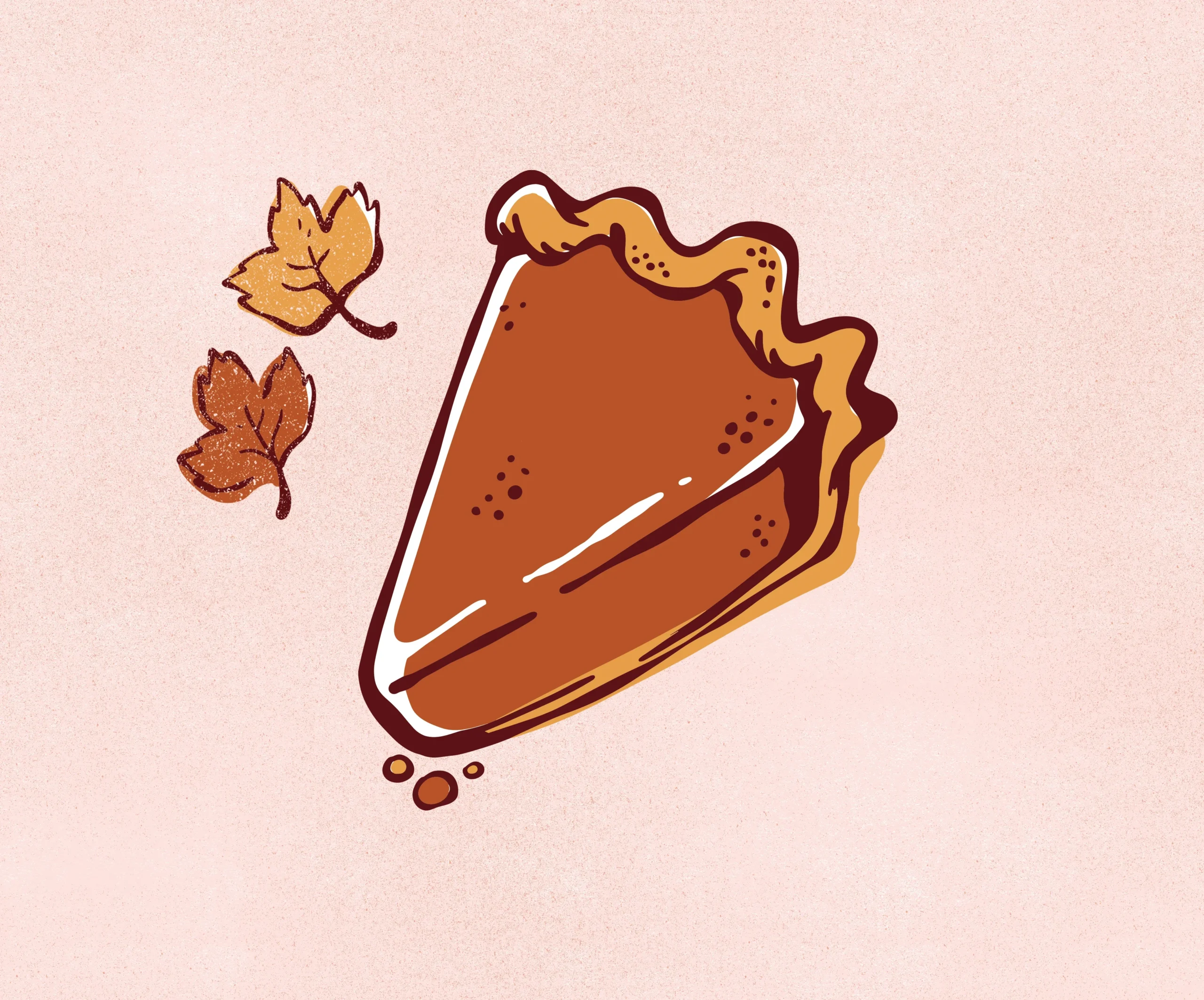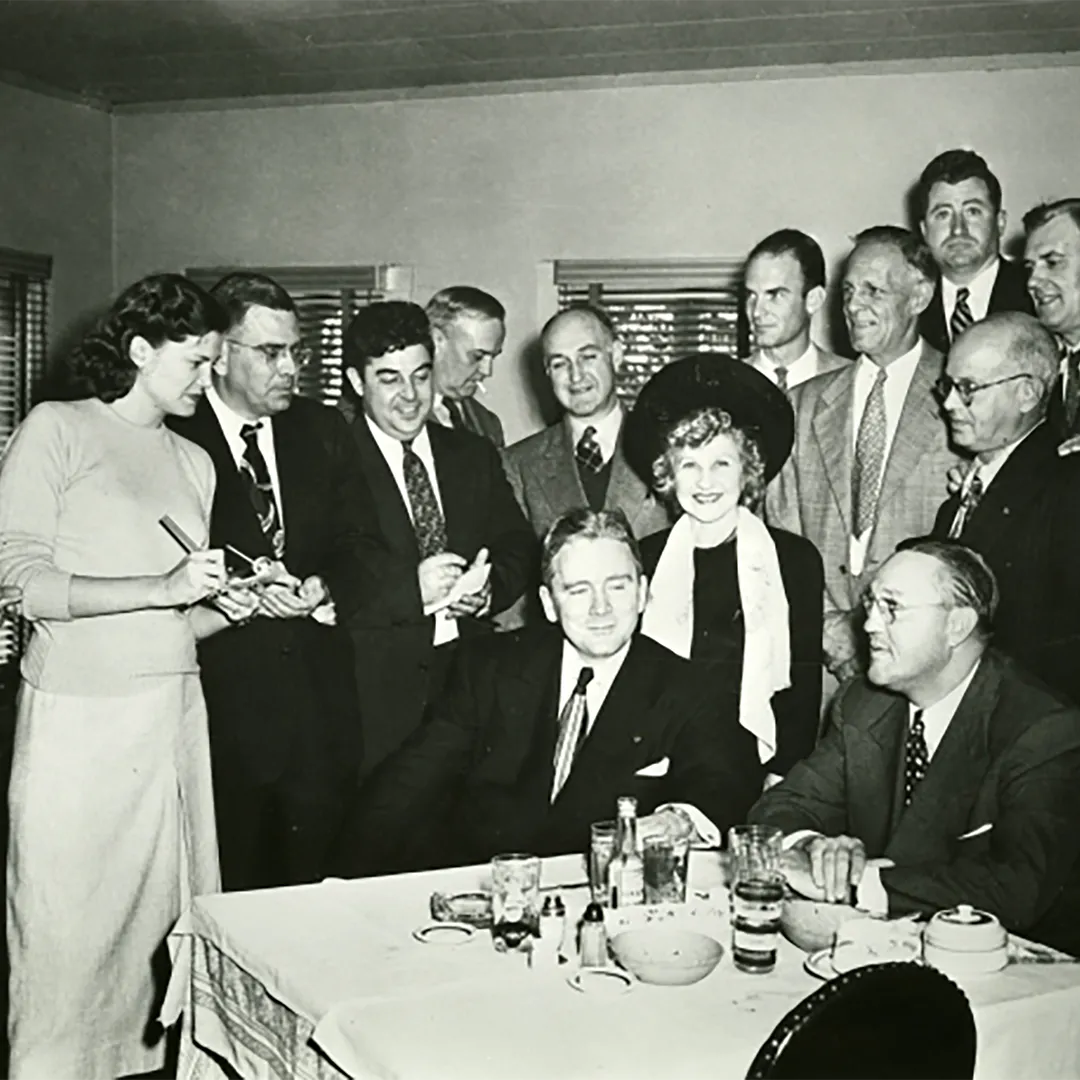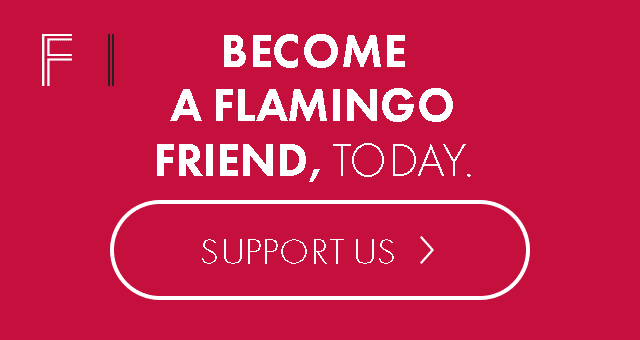by | March 19, 2025
How Olive My Pickle Harnesses the Power of Fermentation for Good
A Jacksonville couple turned an ancient practice into a successful business spreading pickle power across the nation.
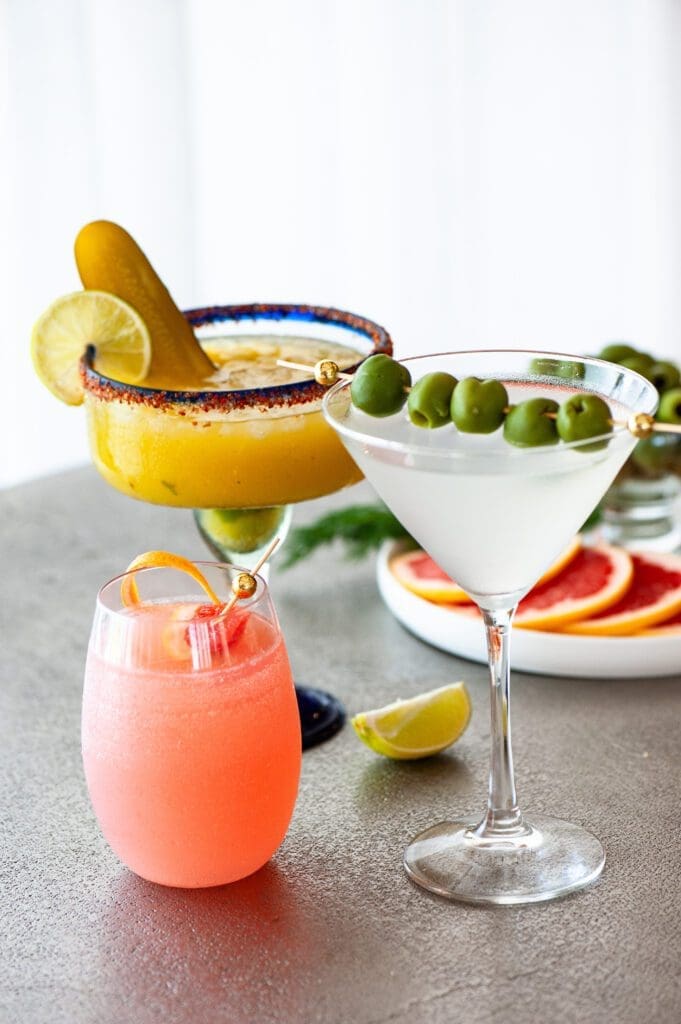
On a recent winter day in Jacksonville, a glowing neon pickle casts its light over barrels of fermented foods, artisanal cheeses and racks of T-shirts with sayings like “Make Pickles Not War.” Giddy shoppers browse blue and pink bags of pickle juice standing proudly on refrigerated shelves alongside a rainbow of pickles, olives, sauerkraut, kimchi and more. A salty refreshing smell fills the air. But in the corner, amid all the technicolor, a collection of mostly black-and-white family photos hang quietly—conspicuously keeping watch. The stern, weathered faces of six generations of southeastern European fermenters stare out from the frames. While pickle-making has been the Tzabari family’s unofficial business for ages, its modern-day iteration—a brick-and-mortar store, viral online presence and nationwide distribution—sprang from a longing for home and the flavors of Israel.
Olive My Pickle Shared Their Recipe for the Dragonfruit & Strawberry Paloma
It’s quite rare to find a naturally fermented food in the modern-day marketplace, and Charlotte Tzabari, Olive My Pickle co-founder, started the product line by accident with her husband, Shai. “We just stumbled right into it,” she says.
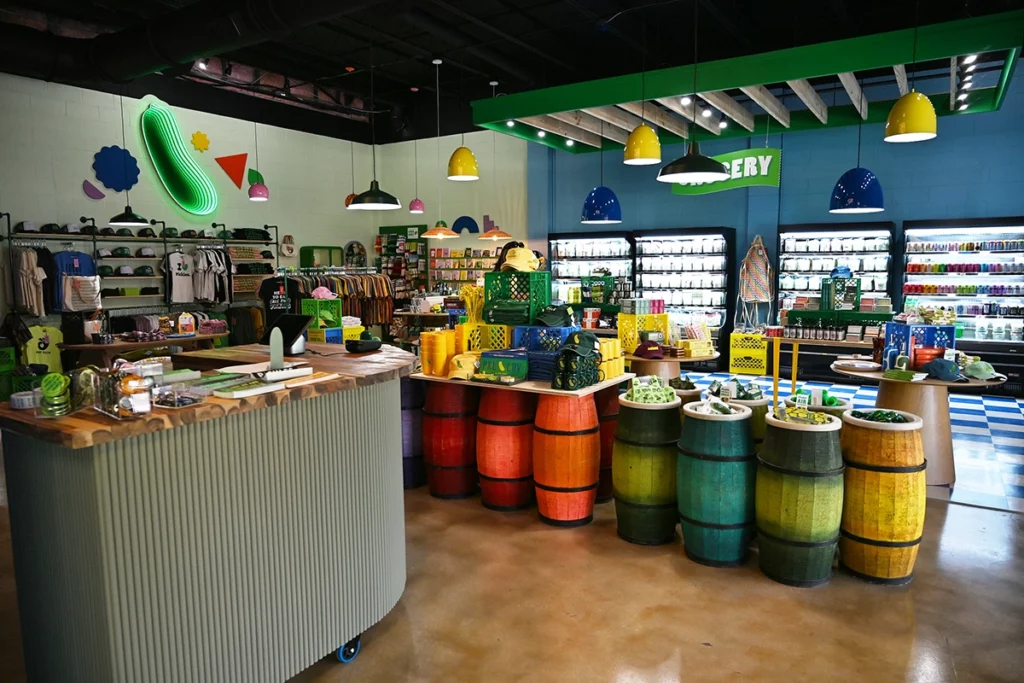
Before Olive My Pickle became an online sensation and they opened their first storefront, The Pickle Factory, in 2024, it was a humble labor of love and a way for Shai to connect with his family’s traditions. In 2008, he was craving the tastes and smells of Israeli cooking—and to cure his homesickness for Haifa, Israel, where he grew up. Shai made a batch of kosher dill pickles at home using an old family recipe from his grandmother, a Bulgarian woman named Ester (he calls her Safta), who fled Europe to escape the Holocaust. It was all-natural and no-nonsense, made with fresh cucumbers, a mix of spices and pure high-mineral sea salt. After the fermentation finished and good bacteria flourished, the vegetables transformed into a tasty pro- and prebiotic-packed superfood—and eventually became Olive My Pickle’s best-selling product.
Make the Pickletini Cocktail—a Classic Martini with a Twist
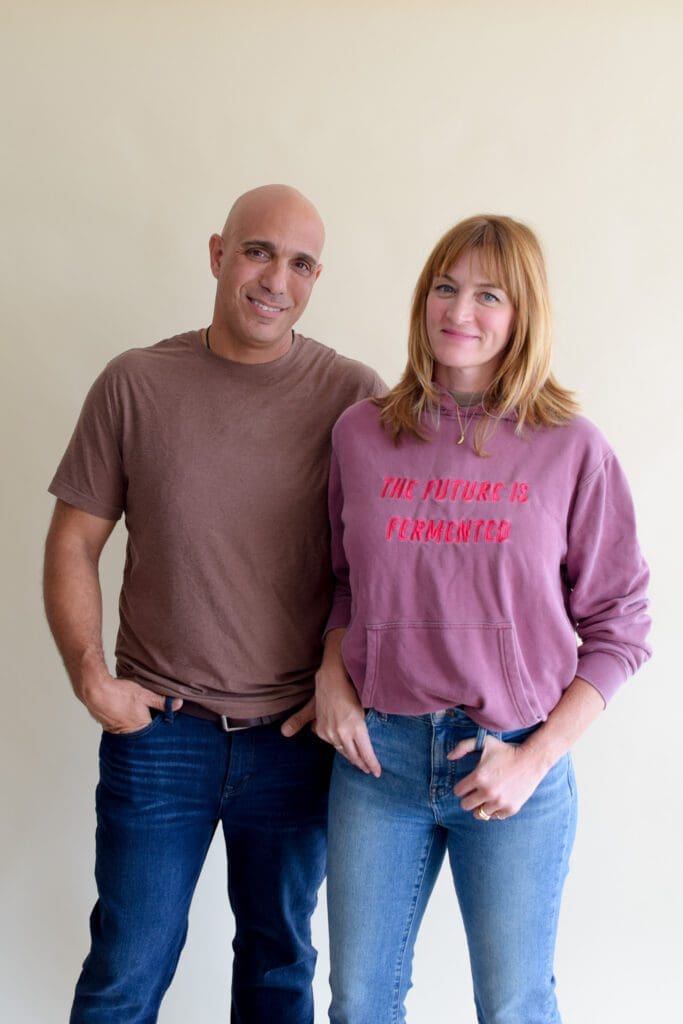
“Food is a big part of the culture in Israel, and (Shai) loves to cook,” Charlotte says. In a brief oral history of fermented foods, Charlotte enthusiastically shares that superfoods like olives and kimchi have been present on ancient tables in Middle Eastern and Asian cultures since early human civilization. Rather than a trendy health fad, fermenting was a way people preserved their food for long winters before the invention of refrigeration. “They may not have known the science, but they intuitively understood that there’s something about these foods—when we eat them with meals, we feel better and we digest better,” she says.
But creating a niche product wasn’t the Tzabaris’ intention. When the couple started making pickles, Shai simply followed his Safta’s recipe. He didn’t know he was creating a superfood and that the process was called lactic acid fermentation, Charlotte says. “He was just making his grandmother’s pickles.”
Shai and Charlotte met as globe-trotters in Brazil, fell in love, married and put roots down in Jacksonville in 2010. Shai had always been passionate about cooking, while Charlotte, a native Californian, worked in consumer branding, sales and marketing. Jacksonville was fertile ground for startups, according to Charlotte. “A city like Jacksonville, which in many ways is sort of anup-and-coming city … There’s ground floor opportunity here, versus an Austin or Nashville.” In the beginning, Olive My Pickle distributed only through farmers markets, eventually launching an online platform for people to easily access their small-batch fermented foods. The pickles, olives, sauerkraut, kimchi, hot sauce and other products from Olive My Pickle all contain probiotics, prebiotics and enzymes, which according to the National Institutes of Health, build and strengthen the gut microbiome—the colony of good bacteria that lives in your body—in a healthy and efficient way, leaving consumers feeling their best.

Aside from eating pickles, one of the easiest ways to reap the fermented benefits is by infusing pickle juice into recipes—or by taking a shot of pickle juice every morning. The Tzabaris sell their enhanced saltwater fermented juice, which they call LiveBrine, by the bag in fun flavors like blue spirulina and lemon, dragonfruit and strawberry, aji amarillo chili and mango and more. “You can take a shot, but you can also make a LiveBrine spritzer or a mocktail or cross the bridge and go into the land of cocktails,” Charlotte says.
Try the Spicy Dill Mango Margarita
Just like the fermented foods they make, Olive My Pickle is constantly moving, growing and changing—
a sure sign that the business is alive and well.
“There are so many people who identify as pickle lovers, and (The Pickle Factory) is a place where they can come and just be delighted and have fun,” Charlotte says.
While today’s success is wrapped in vibrant, fun packaging, it was built on yesterday’s tradition of survival. All one has to do to appreciate the legacy is stop and look at the portraits hanging on the shop’s wall—six generations of Tzabaris watching as the business ages to perfection.
As far as what’s next, Charlotte points to the slogan on her T-shirt: “The Future is Fermented.”
For more cocktails and recipes, click here.
About the Author
As a born-and-raised Floridian, Emilee loves to write, read and talk about the Sunshine State. She graduated from Florida State University with a degree in editing, writing and media. Now, Emilee uses her skills to edit our print issues and online content, as well as write our weekly e-newsletter, Fresh Squeezed.


